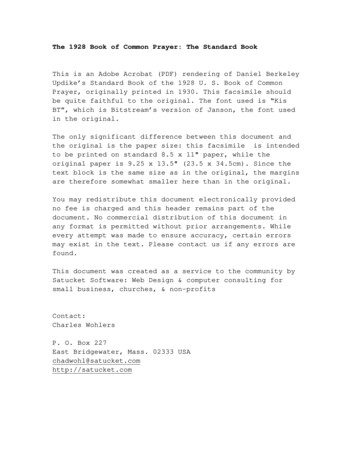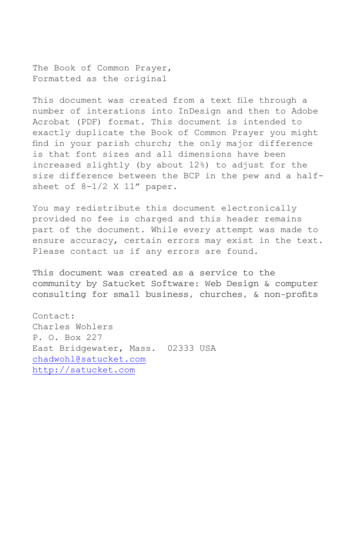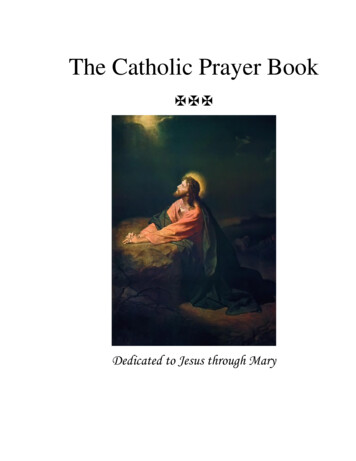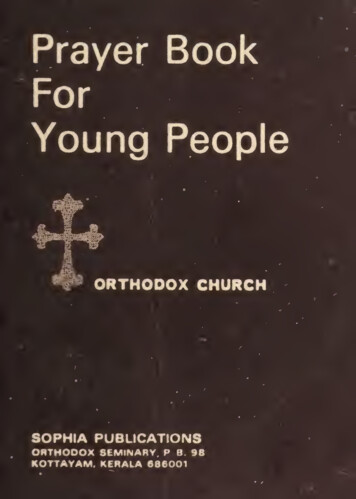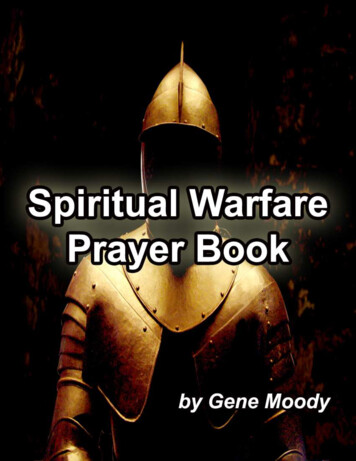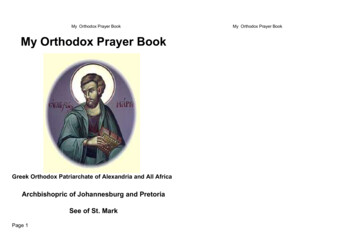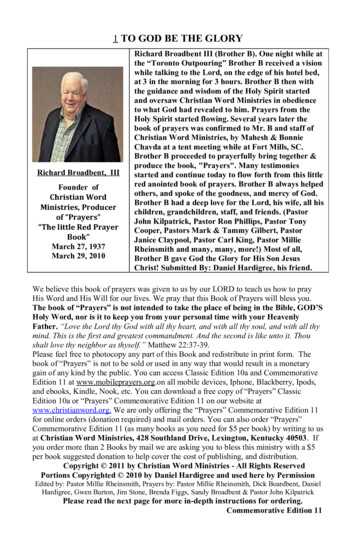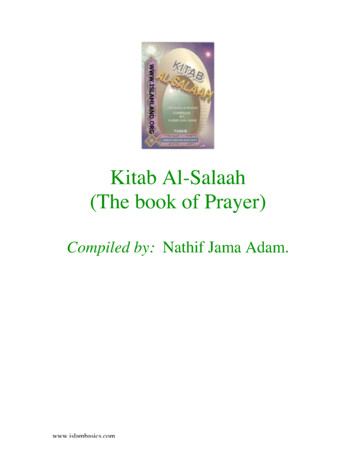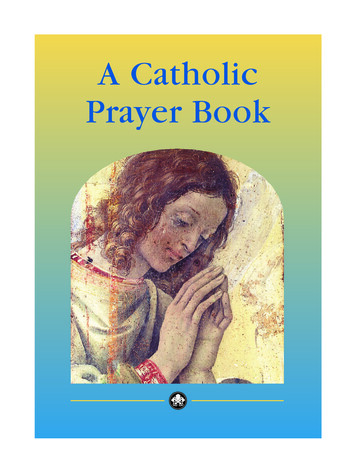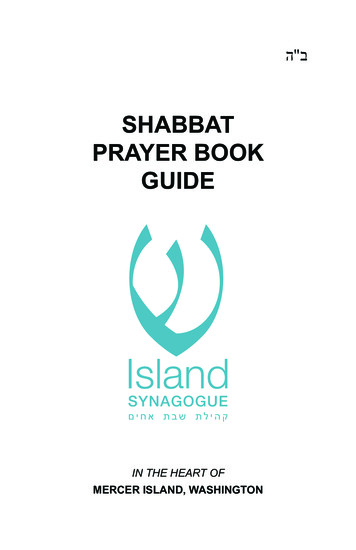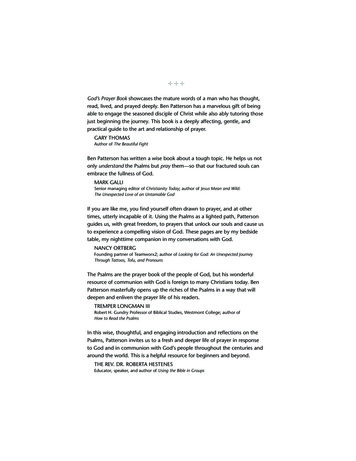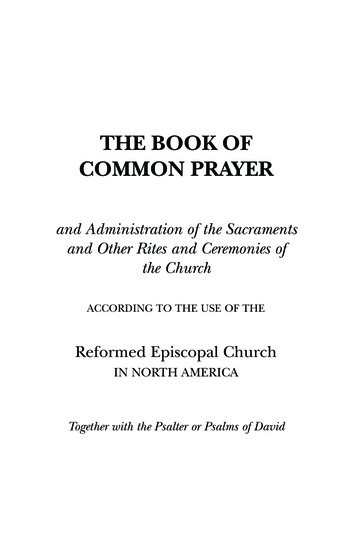
Transcription
THE BOOK OFCOMMON PRAYERand Administration of the Sacramentsand Other Rites and Ceremonies ofthe ChurchACCORDING TO THE USE OF THEReformed Episcopal ChurchIN NORTH AMERICATogether with the Psalter or Psalms of Davidi
CERTIFICATEICERTIFY that this edition of the Book of CommonPrayer conforms to that which has been authorizedfor use by action of the Fifty-first General Council ofthe Reformed Episcopal Church.Nelda L. BanekCustodian of the Standard Book of Common PrayerFeast of the Transfiguration of Christ, A.D. 2005Copyright 2003, 2005, by the StandingLiturgical Commission of the Reformed EpiscopalChurch. All rights reserved. Fourth Edition.ISBN: 1-893293-00-9ii
TABLE OF CONTENTSThe Certification . iiAn Historical Preface.vConcerning the Use of the Book of Common Prayer . xiiiPsalms and Lessons of the Christian Year .xviThe Calendar .livTables and Rules . lviii The Order for Daily Morning Prayer . 3The Order for Daily Evening Prayer . 22The Athanasian Creed . 36The Litany, or General Supplication. 39A Commination . 46A Penitential Office . 50Prayers and Thanksgivings . 56The Order for the Administration of the Lord’s Supper,or Holy Communion . 85The Holy Communion. 93The Alternate Form of Holy Communion . 105The Collects, Epistles, and Gospels . 119 The Psalter . 287 The Order for the Ministration ofHoly Baptism of Infants and Adults. 457Offices of Instruction. 471The Order for Confirmation . 485The Solemnization of Matrimony. 490The Thanksgiving of Women after Child-birth . 497The Order for the Visitation of the Sick. 500The Communion of the Sick . 513The Order for the Burial of the Dead . 516 The Preface to the Ordinal. 533The Form and Manner of Making Deacons . 535The Form and Manner of Ordering Presbyters . 541The Form of Consecrating a Bishop . 552The Litany and Suffrages for Ordinations. 562The Form of Consecration of a Church or Chapel . 565The Form of the Public Reception of Presbyters . 571An Office of Institution of Ministers into Parishes or Churches . 575 A Catechism . 583Forms of Prayer to be used in Families. 593 The Thirty-nine Articles of Religion . 609Declaration of Principles. 623A Table of Kindred and Affinity . 624iii
iv
An Historical Prefacefrom the Book of Common Prayer, 1662IT hath been the wisdom of the Church of England, ever since the firstcompiling of her Publick Liturgy, to keep the mean between the twoextremes, of too much stiffness in refusing, and of too much easiness inadmitting any variation from it. For, as on the one side common experience sheweth, that where a change hath been made of things advisedlyestablished (no evident necessity so requiring) sundry inconvenienceshave thereupon ensued; and those many times more and greater thanthe evils, that were intended to be remedied by such change: So on theother side, the particular Forms of Divine worship, and the Rites andCeremonies appointed to be used therein, being things in their ownnature indifferent, and alterable, and so acknowledged; it is but reasonable, that upon weighty and important considerations, according to thevarious exigency of times and occasions, such changes and alterationsshould be made therein, as to those that are in place of Authority shouldfrom time to time seem either necessary or expedient. Accordinglywe find, that in the Reigns of several Princes of blessed memory sincethe Reformation, the Church, upon just and weighty considerationsher thereunto moving, hath yielded to make such alterations in someparticulars, as in their responsive times were thought convenient: Yetso, as that the main Body and Essentials of it (as well in the chiefestmaterials, as in the frame and order thereof) have still continued thesame unto this day, and do yet stand firm and unshaken, notwithstanding all the vain attempts and impetuous assaults made against it, bysuch men as are given to change, and have always discovered a greaterregard to their own private fancies and interests, than to that duty theyowe to the publick.By what undue means, and for what mischievous purposes the useof the Liturgy (though enjoined by the Laws of the Land, and thoseLaws never yet repealed) came, during the late unhappy confusions, tobe discontinued, is too well known to the world, and we are not willinghere to remember. But when, upon His Majesty’s happy Restoration,it seemed probable, that, amongst other things, the use of the Liturgyalso would return of course (the same having never been legally abolished) unless some timely means were used to prevent it; those menwho under the late usurped powers had made it a great part of theirv
AN HISTORICAL PREFACEbusiness to render the people disaffected thereunto, saw themselves inpoint of reputation and interest concerned (unless they would freelyacknowledge themselves to have erred, which such men are very hardlybrought to do) with their utmost endeavours to hinder the restitutionthereof. In order whereunto divers Pamphlets were published againstthe Book of Common Prayer, the old Objections mustered up, with theaddition of some new ones, more than formerly had been made, tomake the number swell. In fine, great importunities were used to HisSacred Majesty, that the said Book might be revised, and such Alterationstherein, and Additions thereunto made, as should be thought requisitefor the ease of tender Consciences: whereunto His Majesty, out ofhis pious inclination to give satisfaction (so far as could be reasonablyexpected) to all his subjects of what persuasion soever, did graciouslycondescend.In which review we have endeavoured to observe the like moderation, as we find to have been used in the like case in former times. Andtherefore of the sundry alterations proposed unto us, we have rejectedall such as were either of dangerous consequence (as secretly striking atsome established doctrine, or laudable practice of the Church of England, or indeed of the whole Catholick Church of Christ) or else of noconsequence at all, but utterly frivolous and vain. But such alterationsas were tendered to us, (by what persons, under what pretences, or towhat purpose soever tendered) as seemed to us in any degree requisiteor expedient, we have willingly, and of our own accord assented unto:not enforced so to do by any strength of Argument, convincing us ofthe necessity of making the said Alterations: For we are fully persuadedin our judgements (and we here profess it to the world) that the Book,as it stood before established by Law, doth not contain in it any thingcontrary to the Word of God, or to sound Doctrine, or which a godlyman may not with a good Conscience use and submit unto, or whichis not fairly defensible against any that shall oppose the same; if it shallbe allowed such just and favourable construction as in common equityought to be allowed to all human Writings, especially such as are setforth by Authority, and even to the very best translations of the holyScripture itself.Our general aim therefore in this undertaking was, not to gratify thisor that party in any their unreasonable demands; but to do that, which toour best understandings we conceived might most tend to the preservation of Peace and Unity in the Church; the procuring of Reverence, andexciting of Piety and Devotion in the publick Worship of God; and thecutting off occasion from them that seek occasion of cavil or quarrelagainst the Liturgy of the Church. And as to the several variations fromthe former Book, whether by Alteration, Addition, or otherwise, it shallvi
AN HISTORICAL PREFACEsuffice to give this general account. That most of the Alterations weremade, either first, for the better direction of them that are to officiatein any part of Divine Service; which is chiefly done in the Calendars andRubricks: Or secondly, for the more proper expressing of some wordsor phrases of ancient usage in terms more suitable to the language ofthe present times, and the clearer explanation of some other wordsand phrases, that were either of doubtful signification, or otherwiseliable to misconstruction: Or thirdly, for a more perfect rendering ofsuch portions of holy Scripture, as are inserted into the Liturgy; which,in the Epistles and Gospels especially, and in sundry other places, arenow ordered to be read according to the last Translation: and that itwas thought convenient, that some Prayers and Thanksgivings, fitted tospecial occasions, should be added in their due places; particularly forthose at Sea, together with an Office for the Baptism of such as are ofRiper Years: which, although not so necessary when the former Bookwas compiled, yet by the growth of Anabaptism, through the licentiousness of the late times crept in amongst us, is now become necessary,and may be always useful for the baptizing of Natives in our Plantations,and others converted to the Faith. If any man, who shall desire a moreparticular account of the several Alterations in any part of the Liturgy,shall take the pains to compare the present Book with the former; wedoubt not but the reason of the change may easily appear.And having thus endeavoured to discharge our duties in this weightyaffair, as in the sight of God, and to approve our sincerity therein (sofar as lay in us) to the consciences of all men; although we know itimpossible (in such variety of apprehensions, humours and interests,as are in the world) to please all; nor can expect that men of factious,peevish, and perverse spirits should be satisfied with any thing that canbe done in this kind by any other than themselves: Yet we have goodhope, that what is here presented, and hath been by the Convocationsof both Provinces with great diligence examined and approved, willbe also well accepted and approved by all sober, peaceable, and trulyconscientious sons of the Church of England.CONCERNING THE SERVICE OF THE CHURCHTHERE was never any thing by the wit of man so well devised, orso sure established, which in continuance of time hath not beencorrupted: As, among other things, it may plainly appear by the Common Prayers in the Church, commonly called Divine Service. The firstoriginal and ground whereof if a man would search out by the ancientFathers, he shall find, that the same was not ordained but of a goodpurpose, and for a great advancement of godliness. For they so orderedvii
AN HISTORICAL PREFACEthe matter, that all the whole Bible (or the greatest part thereof) shouldbe read over every year; intending thereby, that the Clergy, and especiallysuch as were Ministers in the congregation, should (by often reading,and meditation in God’s Word) be stirred up to godliness themselvesand be more able to exhort others by wholesome Doctrine, and toconfute them that were adversaries to the Truth; and further, that thepeople (by daily hearing of holy Scripture read in the Church) mightcontinually profit more and more in the knowledge of God, and be themore inflamed with the love of his true Religion.But these many years passed, this godly and decent order of theancient Fathers hath been so altered, broken, and neglected, by plantingin uncertain Stories, and Legends, with multitude of Responds, Verses,vain Repetitions, Commemorations, and Synodals; that commonlywhen any Book of the Bible was begun, after three of four Chapterswere read out, all the rest were unread. And in this sort the Book ofIsaiah was begun in Advent, and the Book of Genesis in Septuagesima;but they were only begun, and never read through: after like sort wereother Books of holy Scripture used. And moreover, whereas St. Paulwould have such language spoken to the people in the Church, as theymight understand, and have profit by hearing the same; the service inthis Church of England these many years hath been read in Latin tothe people, which they understand not; so that they have heard withtheir ears only, and their heart, spirit, and mind, have not been edifiedthereby. And furthermore, notwithstanding that the ancient Fathershave divided the Psalms into seven portions, whereof every one wascalled a Nocturn: now of late time a few of them have been daily said,and the rest utterly omitted. Moreover, the number and hardness ofthe Rules called the Pie, and the manifold changings of the service, wasthe cause, that to turn the book only was so hard and intricate a matter,that many times there was more business to find out what should beread, than to read it when it was found out.These inconveniences therefore considered, here is set forth suchan order, whereby the same shall be redressed. And for a readinessin this matter, here is drawn out a Calendar for that purpose, whichis plain and easy to be understood; wherein (so much as may be) thereading of holy Scripture is so set forth, that all things shall be done inorder, without breaking one piece from another. For this cause be cutoff Anthems, Responds, Invitatories, and such like things as did breakthe continual course of the reading of the Scripture.Yet, because there is no remedy, but that of necessity there mustbe some Rules; therefore certain Rules are here set forth; which, asthey are few in number, so they are plain and easy to be understood.So that here you have an Order for Prayer, and for the reading of theviii
AN HISTORICAL PREFACEholy Scripture, much agreeable to the mind and purpose of the oldFathers, and a great deal more profitable and commodious, than thatwhich of late was used. It is more profitable, because here are left outmany things, whereof some are untrue, some uncertain, some vain andsuperstitious; and nothing is ordained to be read, but the very pureWord of God, the holy Scriptures, or that which is agreeable to thesame; and that in such a language and order as is most easy and plainfor the understanding both of the readers and hearers. It is also morecommodious, both for the shortness thereof, and for the plainness ofthe order, and for that the rules be few and easy.And whereas heretofore there hath been great diversity in sayingand singing in Churches within this Realm; some following SalisburyUse, some Hereford Use, and some the Use of Bangor, some of York,some of Lincoln; now from henceforth all the whole Realm shall havebut one Use.And forasmuch as nothing can be so plainly set forth, but doubtsmay arise in the use and practice of the same; to appease all such diversity (if any arise) and for the resolution of all doubts, concerningthe manner how to understand, do, and execute, the things containedin this Book; the parties that so doubt, or diversly take any thing, shallalway resort to the Bishop of the Diocese, who by his discretion shalltake order for the quieting and appeasing of the same; so that the sameorder be not contrary to any thing contained in this Book. And if theBishop of the Diocese be in doubt, then he may send for the resolutionthereof to the Archbishop.Though it be appointed, that all things shall be read and sung inthe Church in the English Tongue, to the end that the congregationmay be thereby edified; yet it is not meant, but that when men sayMorning and Evening Prayer privately, they may say the same in anylanguage that they themselves do understand.And all Priests and Deacons are to say daily the Morning andEvening Prayer either privately or openly, not being let by sickness, orsome other urgent cause.And the Curate that ministereth in every Parish-Church or Chapel,being at home, and not being otherwise reasonably hindered, shall saythe same in the Parish-Church or Chapel where he ministereth, andshall cause a Bell to be tolled thereunto a convenient time before hebegin, that the people may come to hear God’s Word, and to pray withhim.ix
AN HISTORICAL PREFACEOF CEREMONIES,WHY SOME BE ABOLISHED, AND SOME RETAINEDOF such Ceremonies as be used in the Church, and have had theirbeginning by the institution of man, some at the first were of godly intent and purpose devised, and yet at length turned to vanity andsuperstition: some entered into the Church by undiscreet devotion,and such a zeal as was without knowledge; and for because they werewinked at in the beginning, they grew daily to more and more abuses,which not only for their unprofitableness, but also because they havemuch blinded the people, and obscured the glory of God, are worthyto be cut away, and clean rejected: other there be, which although theyhave been devised by man, yet it is thought good to reserve them still,as well for a decent order in the Church, (for the which they were firstdevised) as because they pertain to edification, whereunto all thingsdone in the Church (as the Apostle teacheth) ought to be referred.And although the keeping or omitting of a Ceremony, in itselfconsidered, is but a small thing; yet the wilful and contemptuous transgression and breaking of a common order and discipline is no smalloffence before God, Let all things be done among you, saith Saint Paul, in aseemly and due order: the appointment of the which order pertaineth notto private men; therefore no man ought to take in hand, nor presumeto appoint or alter any publick or common Order in Christ’s Church,except he be lawfully called and authorized thereunto.And whereas in this our time, the minds of men are so diverse, thatsome think it a great matter of conscience to depart from a piece ofthe least of their Ceremonies, they be so addicted to their old customs;and again on the other side, some be so new-fangled, that they wouldinnovate all things, and so despise the old, that nothing can like them,but that is new: it was thought expedient, not so much to have respecthow to please and satisfy either of these parties, as how to please God,and profit them both. And yet lest any man should be offended, whomgood reason might satisfy, here be certain causes rendered, why someof the accustomed Ceremonies be put away, and some retained andkept still.Some are put away, because the great excess and multitude ofthem hath so increased in these latter days, that the burden of themwas intolerable; whereof Saint Augustine in his time complained, thatthey were grown to such a number, that the estate of Christian peoplewas in worse case concerning that matter, than were the Jews. And hecounselled that such yoke and burden should be taken away, as timewould serve quietly to do it. But what would Saint Augustine have said,if he had seen the Ceremonies of late days used among us; whereuntox
AN HISTORICAL PREFACEthe multitude used in his time was not to be compared? This our excessive multitude of Ceremonies was so great, and many of them so dark,that they did more confound and darken, than declare and set forthChrist’s benefits unto us. And besides this, Christ’s Gospel is not a Ceremonial Law, (as much of Moses’ Law was,) but it is a Religion to serveGod, not in bondage of the figure or shadow, but in the freedom of theSpirit; being content only with those Ceremonies which do serve to adecent order and godly discipline, and such as be apt to stir up the dullmind of man to the remembrance of his duty to God, by some notableand special signification, whereby he might be edified. Furthermore,the most weighty cause of the abolishment of certain Ceremonies was,that they were so far abused, partly by the superstitious blindness ofthe rude and unlearned, and partly by the unsatiable avarice of suchas sought more their own lucre, than the glory of God, that the abusescould not well be taken away, the thing remaining still.But now as concerning those persons, which peradventure will beoffended, for that some of the old Ceremonies are retained still: If theyconsider that without some Ceremonies it is not possible to keep anyorder, or quiet discipline in the Church, they shall easily perceive justcause to reform their judgements. And if they think much, that any ofthe old do remain, and would rather have all devised anew: then suchmen granting some Ceremonies convenient to be had, surely where theold may be well used, there they cannot reasonably reprove the old onlyfor their age, without bewraying of their own folly. For in such a casethey ought rather to have reverence unto them for their antiquity, ifthey will declare themselves to be more studious of unity and concord,than of innovations and new-fangleness, which (as much as may be withthe true setting forth of Christ’s Religion) is always to be eschewed.Furthermore, such shall have no just cause with the Ceremonies reserved to be offended. For as those be taken away which were mostabused, and did burden men’s consciences without any cause; so theother that remain, are retained for a discipline and order, which (uponjust causes) may be altered and changed, and therefore are not to beesteemed equal with God’s Law. And moreover, they be neither darknor dumb Ceremonies, but are so set forth, that every man may understand what they do mean, and to what use they do serve. So that it isnot like that they in time to come should be abused as other have been.And in these our doings we condemn no other nations, nor prescribeany thing but to our own people only: For we think it convenient thatevery country should use such Ceremonies as they shall think best tothe setting forth of God’s honour and glory, and to the reducing of thepeople to a most perfect and godly living, without error or superstition;and that they should put away other things, which from time to timexi
AN HISTORICAL PREFACEthey perceive to be most abused, as in men’s ordinances it often chanceth diversly in divers countries.CONCERNING THE PRESENT EDITIONThis edition is based upon the Book of Common Prayer 1662,incorporating selected aspects of subsequent revisions, including theAmerican Book of Common Prayer 1928 and the 1963 edition ofthe Book of Common Prayer according to the use of the ReformedEpiscopal Church.The Lectionary is generally drawn from the altar edition of An Australian Prayer Book 1978, augmented by the Sunday Psalms and Lessons from the 1945 edition of the Book of Common Prayer (PECUSA,1928). The Psalter is the American Coverdale version.The objective of this revision is identical to the purpose stated inthe foregoing Preface: namely, “.to do that, which to our best understandings we conceived might most tend to the preservation of peace and unity in theChurch; the procuring of reverence, and exciting of piety and devotion in thepublick worship of God.”xii
Concerning the Use of theBook of Common PrayerTHE Order for Holy Communion, the Order for Morning Prayer, theOrder for Evening Prayer, and the Litany, as set forth in this Book,are the regular Services appointed for Public Worship in this Church, andshall be used accordingly; Provided, that in addition to these Services, theMinister, in his discretion, subject to the direction of the Ordinary, mayuse other devotions taken from this Book or set forth by lawful authoritywithin this Church, or from Holy Scripture; and Provided further, that,subject to the direction of the Ordinary, in mission churches or chapels,and also, when expressly authorized by the Ordinary, in cathedral orparish churches or other places, such other devotions as aforesaid maybe used, when the edification of the congregation so requires, in placeof the Order for Morning Prayer, or the Order for Evening Prayer.For days of fasting and thanksgiving appointed by the Civil orEcclesiastical Authority, and for other special occasions, for which noservice or prayer has been provided in this Book, the Bishop may setforth such form or forms as he shall see fit, in which case none othershall be used.THE USE OF THE PSALTER AND THE LECTIONARYTHE Old Testament is appointed for the First Lessons, and the New Testament for the Second Lessons, at Morning and Evening Prayerthroughout the year.The Psalms and Lessons to be read every day are to be found in thefollowing Table of Psalms and Lessons for the Christian Year; except onlythose for the Immoveable Holy Days, the Proper Psalms and Lessons forall which days are to be found in the Table for the Fixed Holy Days.On the following days, and their eves, if any, the Proper Psalmsappointed in the Tables shall be used: Christmas, Epiphany, Purification, Ash Wednesday, Annunciation, Good Friday, Easter Day, Ascension Day, Whitsunday, Trinity Sunday, Transfiguration, All Saints, andThanksgiving Day.But note, That on other days, the Minister shall use the Psalmsappointed in the Tables; or at his discretion he may use one or moreof those assigned in the Psalter to the day of the month, or from theTable of Topical Selections of Psalms.xiii
USE OF THE BOOK OF COMMON PRAYERThe Psalms and Lessons appointed for the evening of any day maybe read at the morning service, and any set of morning Psalms andLessons may be read in the evening.The starred (*) Lessons provided for Sundays are particularlyappropriate for use when Morning Prayer with one Lesson precedesthe Holy Communion.Upon any Sunday or Holy Day, the Minister may read the Epistleor the Gospel of the Day in place of the Second Lesson at Morning orEvening Prayer.Upon any weekday, other than a Holy Day, the Psalms and Lessonsappointed for any day in the same week may be read instead of thoseappointed for the Day.When an Octave is observed for any Holy Day, the Psalms and Lessons for the Day may be used upon the Sunday within the Octave.Upon special occasions the Minister may select such Psalms andLessons as he may think suitable.Any Lesson may be lengthened or shortened at the Minister’sdiscretion.HYMNS AND ANTHEMSHYMNS set forth and allowed by the authority of this Church, andAnthems in the words of Holy Scripture or of the Book of Common Prayer, may be sung before and after any Office in this Book, andalso before and after Sermons.When it is desired to use music composed for them, previouslyauthorized liturgical texts may be used in place of the correspondingtexts in this Book.Where rubrics indicate that a part of the service is to be said, it must beunderstood to include or sung, and vice versa.xiv
TOPICAL SELECTIONS OF PSALMSGod the Creator. 8; 19; 33; 65; 111; 104; 145; 147.God the Redeemer. 33; 102:15-28; 103; 111; 126; 113; 114; 130; 138.God the Judge. 1; 11; 7; 46; 97; 50; 62; 82; 75; 76; 90; 96; 98.God’s Glory. 18:1-20; 29; 99; 36:5-12; 46; 148; 150.God’s Sovereignty. 24; 93; 46; 47; 72; 89:1-19; 96; 97; 98; 99; 112; 146;145.God’s Wisdom. 33; 104; 111; 113; 139; 145; 147.God’s Law. 19; 50; 62; 111; 119; 147.God’s Providence. 23, 121; 33; 34; 37:26-41; 124; 89:1-19; 139; 145; 146;147.God’s Mercy. 23; 100; 32; 130; 57; 61; 62; 63; 73; 77; 85; 86; 103; 118;145.The Incarnation. 2; 110; 8; 113; 85; 111; 89:1-30; 102:15-28; 132.The Passion. 22; 40:1-16; 42; 54; 130; 69:1-22, 30-37; 88; 116.The Church. 46; 111; 48; 84; 122; 133; 147.Worship. 5; 26; 43; 63; 65; 66; 67; 122; 84; 138; 96; 100; 102:15-28; 116.Thanksgiving. 30; 67; 65; 92; 100; 98; 111; 103; 107; 116; 134; 138; 145;147; 148; 150.Prayer. 4; 5; 17; 20; 28; 31; 54; 61; 84; 86; 102:15-28; 141:1-4; 142.Trust in God. 27; 31; 57; 146; 62; 63; 71; 73; 77; 91; 118; 121; 124; 125;123; 143.God our Refuge. 4; 20; 17; 37; 46; 49; 54; 61; 71; 91; 103; 121; 146.Divine Guidance. 25; 43; 85; 80; 111; 112.In Time of Trouble. 3; 11; 12; 13; 18:1-20; 20; 46; 30; 146; 40:1-16; 49; 57;85; 62; 63; 80; 86; 90; 107:1-16; 118; 144.Righteousness. 1; 15; 11; 12; 18:21-35; 19; 26; 34; 40:1-16; 92; 111; 112.Peace. 29; 46; 76;
iv v An Historical Preface from the Book of Common Prayer, 1662 IT hath been the wisdom of the Church of England, ever since the first compiling of her Publick Liturgy, to keep the mean between the two extremes, of to
